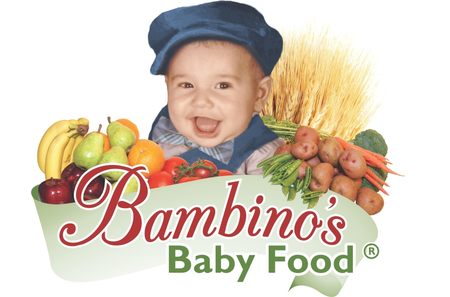
This article addresses the crucial but often overlooked role of seafood in infant nutrition. While beef and poultry traditionally dominate protein choices, seafood offers unparalleled benefits for developing minds and bodies, particularly due to its omega-3 fatty acid content. The piece explores the profound impact of DHA and EPA on brain development and overall health, emphasizing the need for these nutrients in the diets of infants and toddlers. It discusses the innovative approach of Bambino’s Baby Food in introducing seafood to young palates through its Sockeye Salmon and Hali Halibut meals. The article also highlights Bambino’s dedication to quality and its efforts to make seafood a staple in early nutrition, reshaping industry norms and consumer expectations. It concludes with insights...
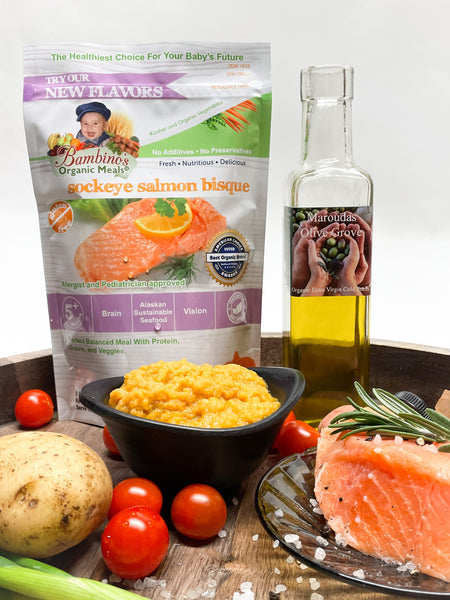
Omega-Rich Horizons: Elevating Infant Health with Seafood and Olive Oil
The article articulates the mission of Bambino’s Baby Food to incorporate essential omega-3 fatty acids from wild-caught Alaskan seafood into infant diets. Emphasizing the cognitive and health benefits of DHA and EPA, it addresses the nutritional gap in baby food options. The company’s innovative products, Hali Halibut and Sockeye Bisque, enhanced with Maroudas olive oil, have set new standards in infant nutrition. The article also highlights the success of Bambino’s in overcoming industry challenges and winning recognition for their nutritious and sustainable approach to baby food.
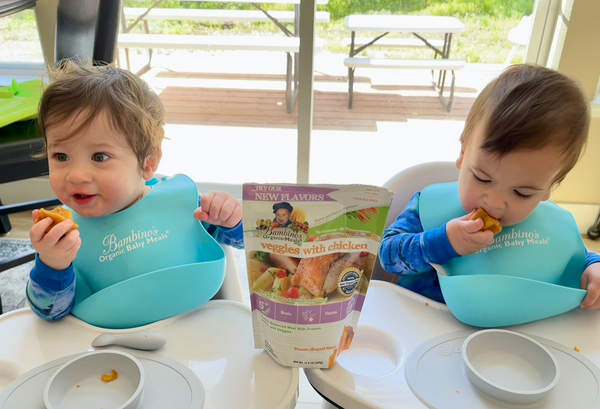
Unlocking Nutritional Excellence: A Roadmap to Health and Wellness
Discover the transformative insights of 'Unlocking Nutritional Excellence,' a guide delving into the impact of Bambino's Baby Food and the Mediterranean diet on early childhood nutrition. Navigate the path to optimal well-being for a healthy future
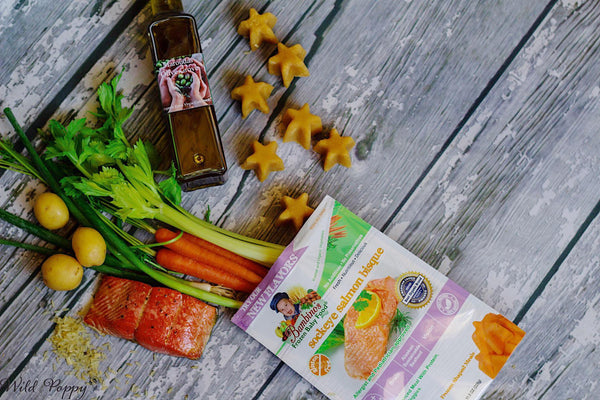
Nourishing Little Minds and Bodies: The Vital Role of Salmon and Maroudas Extra Virgin Olive Oil in Children's Diets
Discover a world of child nutrition excellence with Bambino's Sockeye Salmon Bisque. Packed with Omega-3 goodness from wild-caught salmon and enriched with Maroudas Olive Oil, it's a flavorful, allergy-conscious choice. Elevate your child's well-being with sustainably sourced ingredients.

Ease Teething Discomfort
Bambino’s Frozen Baby Food performs double-duty for fussy babies and sleep-deprived parents. Bambinos patent-pending frozen star-shaped meals are a game changer by providing cold, gum-soothing chewables while delivering nutrient-rich organic meals.
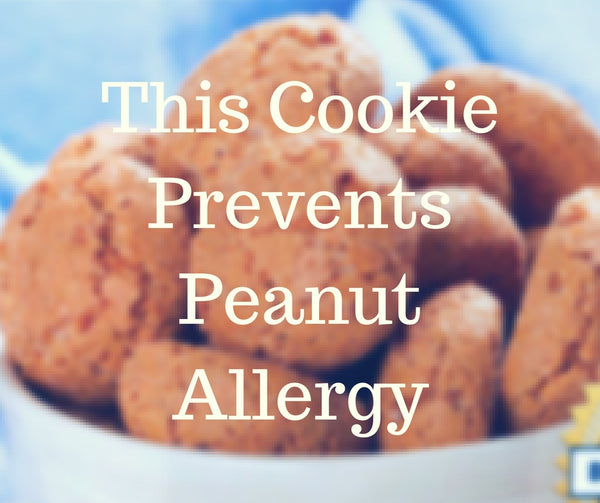
New Research Shows Us How
Peanut allergy is country’s the leading cause of death related to food-induced anaphylaxis. Because so many food products use small amounts of peanut protein, it’s hard to avoid it completely. But is avoiding peanuts the best we can do to protect our children from developing a peanut allergy? Actually, we may want to do the opposite. Let Bambino's show you how.
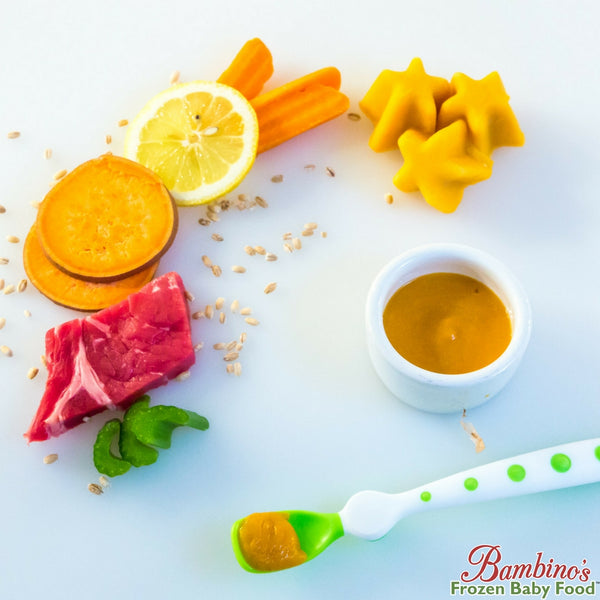
Why Babies Need Iron and Where to Get It
Babies need iron - and lots of it. Iron deficiency can lead to cognitive delays, behavior problems, and ADHD. As babies transition to solids, it's important to make sure their developmental need for iron is being met through their first foods.
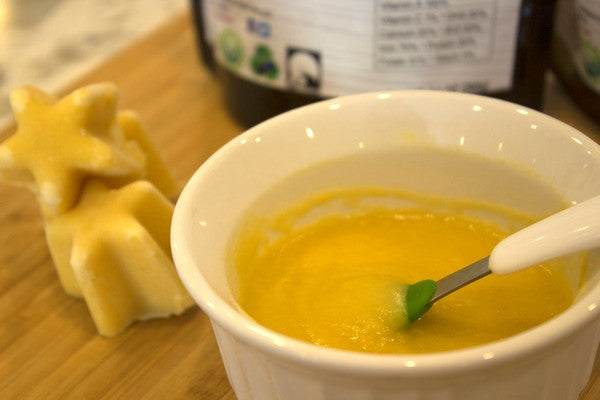
Feeding Your Baby’s Brain
The first two years of a child’s life are filled with incredible growth milestones. They begin crawling, walking, and even saying their first words. Watching our baby’s brain develop as he/she learns about the world around him/her is one of life’s rarest joys, which is why it’s so important to introduce baby to the proper nutrition. But what exactly should you be feeding your baby? If you follow blogs and articles on health and wellness, you can quickly become overwhelmed and exhausted—there are so many opinions and ideas out there, that it’s hard to keep up! However, your baby’s brain development is no joke, and trustworthy health authorities swear by healthy fat, Omega-3, specifically DHA, as brain food. Here are...

Building Baby’s Immunity
Autumn has arrived, bringing beautiful colored leaves, cooler temperatures, and other seasonal treasures. While there’s much to enjoy during the changing of the seasons, this time of year can have a negative impact on tiny immune systems, bringing allergies, the common cold, and even the flu. This article will help you make informed decisions that will protect your child’s immune system this fall. The cold, hard truth about colds Carol J. Baker, M.D., a professor of pediatrics at Baylor College of Medicine, in Houston explains that most children under the age of 3 will have six to eight colds per year. And unlike adult viruses, it’s perfectly normal for pediatric colds to hang on for up to 14 days. Although...
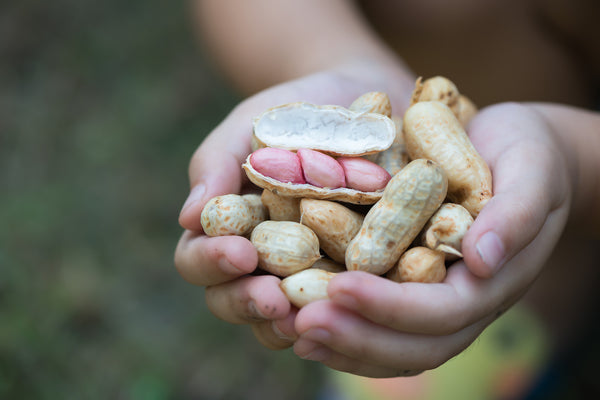
How to Prevent the Dreaded Peanut Allergy
Peanuts are the most common food allergy. Many schools ban peanuts and foods containing peanut ingredients to protect students from having dangerous allergic reactions after coming into contact with peanut products. But is avoiding peanuts the best you can do to protect your child from developing a peanut allergy? Actually, you may want to do the opposite. That’s why we at Bambino’s Baby Food created the Peanut Mani Cookies. About Peanut Allergies About 1.5% of children have a peanut allergy. Diagnosis usually occurs before two years of age. They could grow out of it, but there is no cure. Peanut allergy reactions are often more severe than for other food allergies, and because so many food products use small amounts...
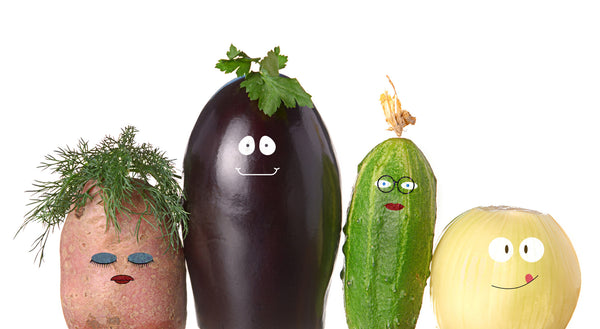
How Antioxidants Benefit Your Baby
In the early 1990s, the health and wellness community introduced a new term to our common vernacular: antioxidants. Now a popular buzzword, “antioxidants” is a term that gets thrown around to encompass a whole family of disease-fighting molecules. While some of us understand that we can absorb antioxidants into our body through eating fruits and vegetables, most people don’t know exactly why antioxidants provide health benefits and how those benefits can directly affect our children’s nutrition. Free Radicals and Oxidative Stress Explained As you age, workout, and digest food, your body tissues suffer from “oxidative stress” due to the process of oxidation. Oxidation occurs when molecules within your body lose electrons to electrically-charged molecules of oxygen in your blood stream....
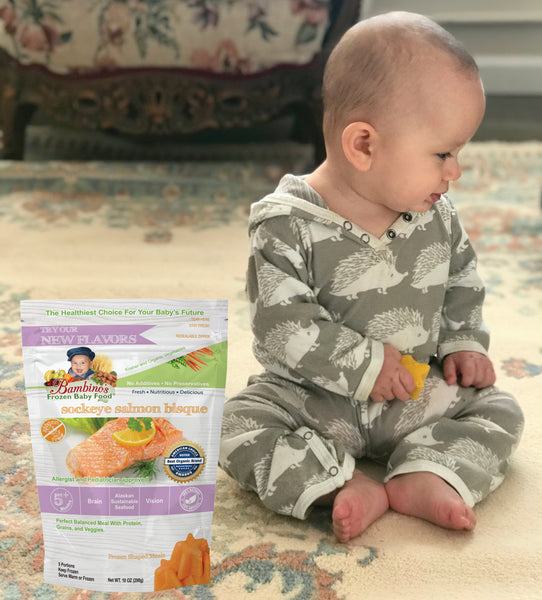
How to Reduce Food Allergy Risks for Your Baby
Food allergies and various forms of food sensitives can range from annoying to life-threatening, but is sheltering your baby from certain foods beneficial? The traditional parent approach has been to delay the introduction of certain foods as to not trigger an allergy. According to the latest research, however, parents who introduce highly allergenic foods later than 4 to 6 months produce a higher instance of food allergies in children. What Does the Research Say? In 2000, the American Academy of Pediatrics released information recommending that parents delay the introduction of certain foods, which are known for being highly allergenic for infants: cow’s milk until age 1 year; egg until age 2 years; and peanuts, tree nuts, and fish until age...
DHA – Your Pregnancy & Your Baby
Scientific research is constantly expanding our knowledge of nutritional needs during pregnancy, as well as for our infants and toddlers to ensure optimal physical and brain development. Among the most recent developments in this field is the importance of omega-3 fatty acids (EPA & DHA) in both the development of a healthy baby and in the health of the mother. Omega-3s, a family of long-chain polyunsaturated fatty acids - essential nutrients for health and development, are not produced by our bodies and must be obtained via our diet or supplementation. Today we are focusing on the DHA component. DHA omega-3 is found throughout the body, but is the most abundant in the brain, eyes, and heart. In fact: 97 percent of all...
Is My Baby Ready to Eat Solid Foods?
As your infant begins to hit important growth and developmental milestones, many parents agonize over when to introduce solid foods. Experts and physicians differ on the exact timing—between 4 and 6 months is a big window—and they also disagree on which types of foods babies should start eating first. You could spend hours scouring the Internet for the most up-to-date research and opinion articles on this complicated subject, but thanks to the creators of Bambino’s Frozen Baby Food, you don’t have to. In this article, Bambino’s will debunk some myths about introducing solid food that circulate and confuse parents. In addition, we will explain the primary signs your baby is ready to begin eating solid food. Myth #1: Leading experts...

Should You Feed Your Baby On Demand?
Parents want to provide the right nutrition to their infant at times that match his/her physical needs, encourages healthy development, and promotes infant contentment. But establishing a successful method can be difficult when also trying to learn your baby’s cues and create a routine. Most experts stand behind one of two types of feeding styles – on demand and scheduled. Learning the benefits and drawbacks of both methods can greatly help parents manage their ideological and practical needs. Demand feeding: An on-demand approach to feeding simply suggests that parents should watch their baby for hunger cues and respond by feeding when their baby is clearly hungry. This style of feeding has moved away from a clock-directed method, and instead encourages...
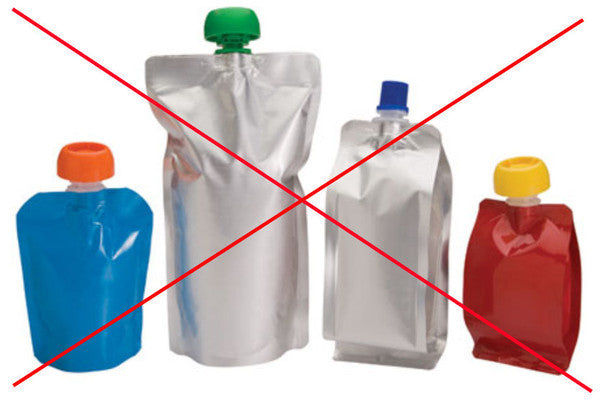
Taking a Stance against Food Pouches
Taking a Stance against Food Pouches As a modern parent who inevitably juggles a busy schedule, eating on the run can seem necessary for survival. While grabbing a protein shake or smoothie instead of a sandwich can save time for you, there hasn’t been a way to speed our children through the eating process—until now. In the early 2000s, food pouches hit the baby food market, but began to take off in more recent years. When introduced, the product was designed with squeeze ability and a little nozzle to simplify the food-to-spoon process for moms, allowing them to feed their babies more easily. As the pouches were more widely adopted, parents discovered how easily babies could suck the food directly...
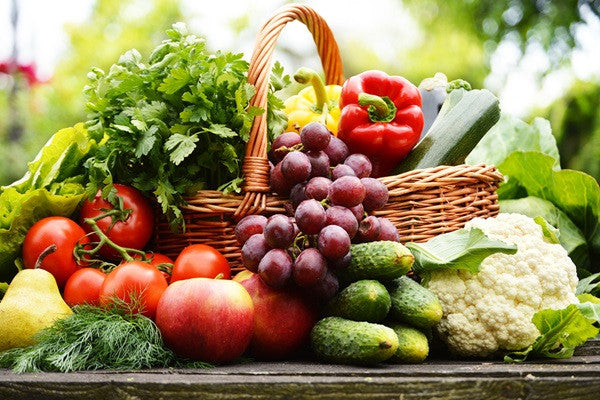
Top 8 Organic Foods to Maximize Your Baby’s Nutrition
In a previous post, I outlined why Bambinos nutritionists have identified organically sourced foods as the best choice when it comes to feeding your little ones. (Add hyperlink to post) Understandably, it’s not always possible to exclusively buy organic, especially when organic foods come with a high dollar price tag. Still, making even just a few changes to your purchasing habits can greatly benefit the overall health of your baby. Nutritionists agree on 12 particular fruits and vegetable that should always be purchased from your grocer’s organic section—this list is called “The Dirty Dozen.” For children, however, this list can be modified to include the food items they eat most frequently. Not many 5-month-olds are munching on celery, for...
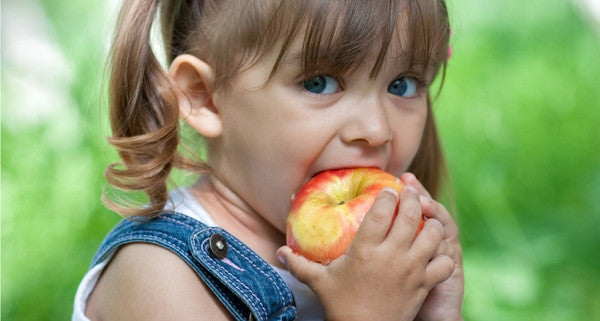
Is Organic Right for My Baby and Me?
As you begin introducing a wide spectrum of produce, grains, and protein into your little one’s diet, you will most likely have to answer the following question: “Is organic food the right choice for my family and me?” Before you can answer that question, it’s important to understand what the term “organic” means. According to Organic.org, organic produce and other ingredients are grown without the use of pesticides, synthetic fertilizers, sewage sludge, genetically modified organisms, or ionizing radiation. And animals that produce meat, poultry, eggs or dairy do not take antibiotics or growth hormones. Bambino’s nutritionists recommend that all your food come from organic sources, and here are a few reasons why: Antibiotics 80% of the antibiotics sold in the...

Paving the Road to Optimum Health.
Part II: The Royal Ten
In our last post, we shared the first five markers in your journey to your optimum health. Have you taken the first steps? Are you excited to hear more? We can’t wait to hear your stories as you move forward. Here are tips 6-10. 6. Fruit – your best option for “sweet.” Fruit makes a great dessert or snack. Eat with nuts – the protein will balance the glucose tolerance factor. Variety is always a plus. 7. Learn to enjoy seeds, nuts, and legumes. Choose them as a delicious replacement for high-sugar, high-carb processed foods. Skip the sweetened ones – go for roasted with sea salt. They make a great salad topping. Beans make a great source of protein and fiber...

Paving Your Baby’s Journey to Optimum Health Begins with Paving Your Own.
Part I: The First Five
Feeding their babies tasty meals that provide optimum nutrient levels for healthy physical and mental growth is a high priority for caring parents. Of course, one of the best ways to acquaint babies’ taste buds to healthy choices and to teach our children to choose and enjoy these same foods as they grow is to set the example in our “grown-up” diets. Research continually documents that people who put an emphasis on produce, fish, whole grains, and healthy fats not only weigh less, but also improve their armory against heart disease, depression, and dementia. It seems obvious and yet, sometimes we all need a little help and guidance, so Bambinos put together ten basics tips and guidelines to helping you...
